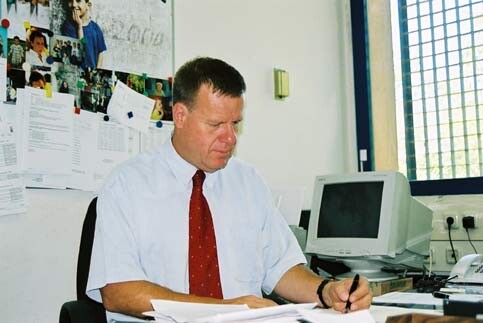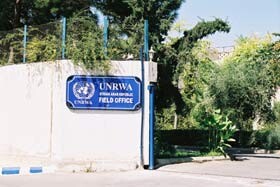The Electronic Intifada 5 October 2004

Lex Takkenberg (Photo: Victor Kattan)
Syria is a country that few people in the West know much about, or care to visit. After all, it is one of the countries that George W. Bush declared part of the “Axis of Evil.” But when I travelled to Syria for the first time, I could not find anything “evil” about it. Indeed, I did not find anything “evil” in the way Syria treats Palestinians who were forced to flee their homeland in 1948; and after my interview with Lex Takkenburg, Deputy Director-General of the U.N. refugee agency for Palestinian refugees (UNRWA) in Syria, I concluded that “compassionate” would be a more accurate description of Syria than “evil.”
Greeting me at his office with a cup of tea, Lex Takkenberg and I sat down to talk about the predicament of Palestinian refugees in the Middle East. Takkenberg is one of the world’s leading experts on the legal status of Palestinian refugees, combining fifteen years of experience working for UNRWA with academic distinction. Takkenberg spent ten of the fifteen years working for UNRWA in the Gaza Strip and the West Bank. After many years of working in the Palestinian territories one gets the feeling that Takkenberg enjoys the change of working in Syria - in an environment that has been very welcoming to the Palestinian refugees.
He tells me that in stark contrast to working with the Israeli military authorities, “where there is the complete absence of a normal state framework” (because of Israel’s ongoing 37 year military occupation), in Syria the government has always been generous to Palestinian refugees. “What distinguishes Palestinian refugees in Syria from the West Bank and Gaza is a stable political environment; a country in which they generally have access to basic services and economic opportunities which have resulted in a considerable level of integration into the society. In Syria it is not a conflict situation, it is a partnership.” UNRWA in Syria is embarking on a number of large scale projects to upgrade the refugee camps with the full support of the Syrian government, something he does not think possible in the Palestinian territories under the prevailing circumstances.
Takkenberg describes UNRWA’s relationship with Israel, calling it complicated. Although in 1967 the Israeli government had requested UNRWA to continue its services for the benefit of the Palestinian refugees, it never perceived UNRWA as a neutral organization and accordingly treated it with a certain level of suspicion. This does not make life easy for the organisation. In regards the treatment of Palestinian refugees in Syria, Takkenburg says that although Syria has not naturalized the refugees as Syrian citizens, nevertheless they have been given “a legal status virtually identical to most Syrians.” Palestinian refugees can join the army and work for the government.
Takkenberg points out that the Palestinians in Syria are “part and parcel of society,” a position very different from that which exists in Lebanon “where the Palestinians are marginalized, are barely tolerated, and are finding themselves as a result in a very vulnerable situation.” By contrast, in Syria for a lot of issues, “it’s not important whether one is a Syrian or a Syrian-Palestinian.” Takkenburg believes that this is principally because Palestinian refugees in Syria, unlike those in Israel, Jordan, and Lebanon, are not perceived as a demographic problem. The Palestinian presence in Syria has never constituted more than 2 - 2.5 percent of the population.
As for Syria’s position regarding the Palestinian refugee issue under international law, Takkenburg says that the Syrian government has always taken the position that the peace process should be guided by the relevant resolutions of the United Nations, including U.N. General Assembly resolution 194 (III) of 1948, as re-confirmed in later resolutions. He thinks this is the reason why Syria has on the one hand given Palestinian refugees a strong legal status, yet on the other hand has not given them Syrian nationality. As long as these resolutions are not overtaken by later resolutions of the General Assembly and/or the Security Council, he does not expect that the Syrian government would change its position - at least not its formal position which it reiterates repeatedly in international fora and in his interaction with the government.

The gate of UNRWA’s Syrian field office (Photo: Victor Kattan)
Takkenburg explains one of the most successful initiatives undertaken by UNRWA in both the occupied territories and in Syria, the Micro-Finance and Micro-Enterprise Programme. What sparked the idea was UNRWA’s wish to secure the livelihood of thousands of Palestinians in the territories. After the First Gulf War in 1991 there was a significant drop in the number of Palestinian workers receiving permits to work in Israel. The programme, which is operating very successfully, was first established in the occupied territories, then in Jordan and Syria. It is an income generation programme offering loans to small and medium sized businesses. According to Takkenburg “this happened at a time when globally, the development community had discovered credit as a powerful tool to alleviate poverty and stimulate economic activity in the informal sector of the economy.”
The programme provides a number of different loan products to different segments of the Palestinian population. These are small, individually guaranteed loans offered to persons in the informal sector who may have a small shop at home or a retail shop in the camps where they sell certain produce. Because such persons do not have officially registered businesses, it is very difficult for them to obtain loans from commercial institutions like banks or other financial institutions. Their inability to provide collateral for the loans also puts them at a disadvantage. The loans are guaranteed by promissory notes or post-dated cheques. Takkenberg says that using these contract enforcement tools seem to provide a very powerful deterrent against default. This is because in both Palestine and Syria persons who default on their cheques are liable to criminal prosecution. Defaults are therefore rare.
Another successful loan product, Takkenberg mentions, is the UNRWA system for women entrepreneurs called “solidarity lending.” This is a system where women, in groups of five to seven, collectively guarantee each other’s loans - thereby all sharing responsibility against one of their number defaulting on the loan. Together these various loan products have become such a success that UNRWA’s “Micro-Finance and Micro-Enterprise Programme” is currently the biggest non-bank financial institution operating in the occupied territories. Moreover the programme is totally self-financed as all the expenses of the programme are covered by interest that the refugees pay on their loans.
There are 413,827 Palestinian refugees in Syria. Of these 120, 865 live in 10 refugee camps spread throughout Syria mostly within the vicinity of Damascus. The largest of these camps is Sbeineh with 21,869 refugees. The largest Palestinian refugee camp in the Middle East is Jabalia (107,415), followed by Rafah (93,928), Beach (78,158), Nuseirat (66,691) and Khan Yunis (62,927) - all in Gaza. The largest refugee camp in the West Bank is Balata (21,445) and in Lebanon it is Ein el-Hilweh (45,337). Baqa’a (86,514) is the largest camp in Jordan. Mar Elias (1,411) is the smallest Palestinian refugee camp in the Middle East situated by the sea near Beirut in Lebanon. Most Palestinian refugees no longer live in refugee camps but in major towns and cities. Of 4,136,449 Palestinian refugees registered with UNRWA, only 1,316,710 live in refugee camps.
On 1st October Takkenberg takes over as Director-General of the Syrian Field Office in Damascus. He is the author of the book Palestinian Refugees in International Law published by Oxford University Press in 1998 which recently was published in Arabic by the Institute of Palestine Studies.
Arab Media Watch Correspondent and committee member Victor Kattan is an ocassional contributor to the Electronic Intifada. Victor was a U.N. Development Program TOKTEN Consultant to the Badil Resource Center for Palestinian Residency and Refugee Rights from May-August 2003 and from November-February 2004. In July his article “The Right of Return Revisited” was published in a special edition of the Mediterannean Journal of Human Rights.



